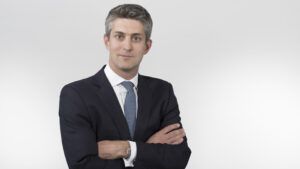There are many complexities to consider when investing with an ESG lens, particularly if you are an investor that has chosen to back the biggest polluters’ transition to a low-carbon world.
And there is no better example of the challenges that can be thrown up than the recent conundrum faced by Invesco managers when they discovered a Portuguese utility stock they owned was downgraded by a rating provider for producing too much coal on the back of regulatory constraints and government intervention – despite the company setting ambitious near-term targets to cut their emissions.
Oliver Collin, co-head of European equities and manager of the Invesco Euro Equity Fund, Pan European Equity, and Invesco Pan European Income Funds, said the team invested in EDP, a fully integrated utility company listed in Portugal, and supported a rights issue because the company “absolutely has the ability to transition and, crucially, the willingness to improve”.
Addressing the exclusion versus engagement debate, he told ESG Clarity EU: “Exclusion strategies are a risk to the ultimate goal of carbon reduction.
“The inconvenient truth is it is expensive to decarbonise, we need money to do it. If we starve capital from the highest emitters, there is a massive incentive to move those assets off the balance sheet, privatise them and they disappear from the public conversation.
“This would slow the pace down of moving to a green economy.”
EDP, he said, has historically been a carbon-intensive power generator with distribution networks across Europe. In 2019, it set “very firm” targets for emissions reductions including having no coal power production by 2025 and no hydrocarbon production by 2030, meaning by then the company’s power production will be solely based on hydrogen, wind and solar.
“It still had some oil and gas plants but it also had the technology and the willingness to transition, which it demonstrated by setting those hard, measurable targets.”
However, the issue for the utility company is they are not independent from government regulation and intervention, Collin added. They can’t simply shut a coal plant – governments in those jurisdictions must approve the closures.
For EDP, the Portuguese government approved the closure of the coal plant and the Spanish government approved the exit plans on forward-looking basis, but then the Ukraine invasion and the energy shortage occurred, followed by the droughts in Spain impacting hydro power generation, Collin explained.
“This meant that coal became main power generation for the country and therefore Spain delayed the closure of those plants – it was a social responsibility issue.”
While Collin was frustrated, he understood EDP was still set on closing its coal plants and ramping renewables, it was just constrained.
The next spanner in the works, however, was a third-party rating provider downgrading EDP from an ESG perspective.
“EDP’s disclosure of its coal and carbon emissions was OK but not hugely detailed. Because [the data provider] ISS didn’t have clarity in the annual report it went to the second stage of its analytical process. The way it assesses coal is based on their power generation – if ISS hasn’t got that data it will take percentage power of coal and apply that to all the business.
“As a result, it deemed the company was making more than 10% of its revenue from coal. This generalised approach to assessing integrated utilities, when there really is no one-size-fits-all, has ended up penalising a business that is not doing things wrong,” Collin said.
This could also potentially cause Article 8 fund managers to not meet criteria. Collin explained Invesco has implemented “safeguards” to ensure it is meeting its interpretation of Article 8 requirements – something that wouldn’t be uncommon in the wider industry – and holding a company with more than 10% revenue from coal would fall foul of that.
“If we were reliant on one single data provider that would mean we Invesco wouldn’t meet the [self-imposed] Article 8 requirements.
“However, we have a holistic approach and can do our own assessments, and make our own judgement call on whether to stay invested,” he said.
The Invesco team disagreed with ISS’s assessment and embarked on an engagement mission.
“We spoke to ISS to make sure we understood its modelling, not saying it was wrong but ensuring we understood it.
“And we also spoke to EDP and told management we need them to be much clearer with disclosures so this doesn’t happen again.”
The reality is, however, some investors would have been prompted to sell EDP despite them ruling out coal by 2025.
“If an investor was taking ISS like the letter of the law – they would have deduced they cannot invest or fund that rights issue. That would lead to slow green development and slow the outcome we are all craving for more renewables.”
So what are the lessons investors and the industry needs to learn in this rapidly evolving part of the investment world?
Collins said: “This highlights all stakeholders need to be more engaged; companies need to think carefully about their criteria and goal of that criteria, investors need to think about where they are inclusive and data providers need to consider there is a lot at stake if they get this wrong.”
